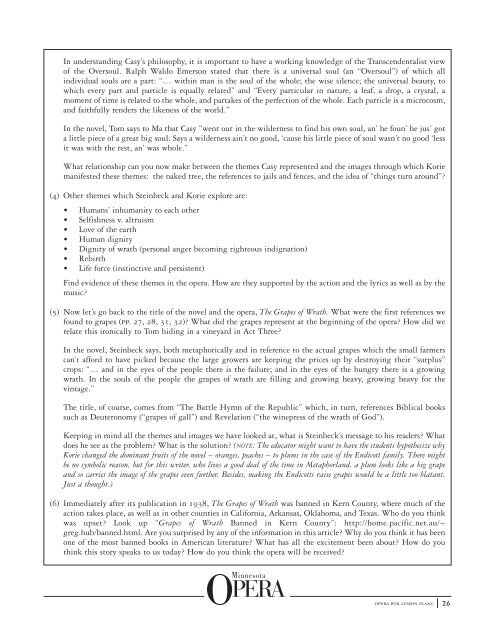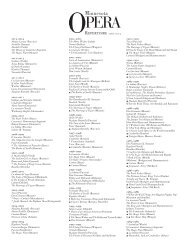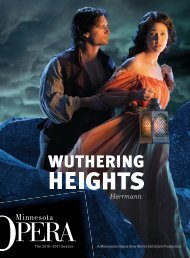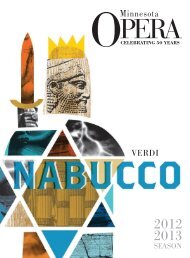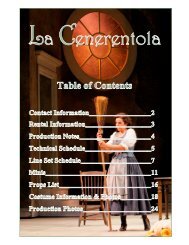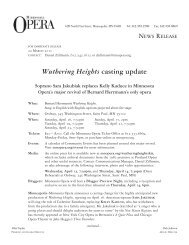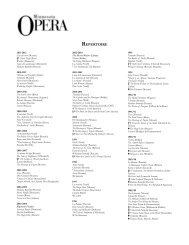Create successful ePaper yourself
Turn your PDF publications into a flip-book with our unique Google optimized e-Paper software.
In understanding Casy’s philosophy, it is important to have a working knowledge of the Transcendentalist view<br />
of the Oversoul. Ralph Waldo Emerson stated that there is a universal soul (an “Oversoul”) of which all<br />
individual souls are a part: “… within man is the soul of the whole; the wise silence; the universal beauty, to<br />
which every part and particle is equally related” and “Every particular in nature, a leaf, a drop, a crystal, a<br />
moment of time is related to the whole, and partakes of the perfection of the whole. Each particle is a microcosm,<br />
and faithfully renders the likeness of the world.”<br />
In the novel, Tom says to Ma that Casy “went out in the wilderness to find his own soul, an’ he foun’ he jus’ got<br />
a little piece of a great big soul. Says a wilderness ain’t no good, ‘cause his little piece of soul wasn’t no good ‘less<br />
it was with the rest, an’ was whole.”<br />
What relationship can you now make between the themes Casy represented and the images through which Korie<br />
manifested these themes: the naked tree, the references to jails and fences, and the idea of “things turn around”?<br />
(4) Other themes which Steinbeck and Korie explore are:<br />
• Humans’ inhumanity to each other<br />
• Selfishness v. altruism<br />
• Love of the earth<br />
• Human dignity<br />
• Dignity of wrath (personal anger becoming righteous indignation)<br />
• Rebirth<br />
• Life force (instinctive and persistent)<br />
Find evidence of these themes in the opera. How are they supported by the action and the lyrics as well as by the<br />
music?<br />
(5) Now let’s go back to the title of the novel and the opera, The <strong>Grapes</strong> of Wrath. What were the first references we<br />
found to grapes (pp. 27, 28, 31, 32)? What did the grapes represent at the beginning of the opera? How did we<br />
relate this ironically to Tom hiding in a vineyard in Act Three?<br />
In the novel, Steinbeck says, both metaphorically and in reference to the actual grapes which the small farmers<br />
can’t afford to have picked because the large growers are keeping the prices up by destroying their “surplus”<br />
crops: “… and in the eyes of the people there is the failure; and in the eyes of the hungry there is a growing<br />
wrath. In the souls of the people the grapes of wrath are filling and growing heavy, growing heavy for the<br />
vintage.”<br />
The title, of course, comes from “The Battle Hymn of the Republic” which, in turn, references Biblical books<br />
such as Deuteronomy (“grapes of gall”) and Revelation (“the winepress of the wrath of God”).<br />
Keeping in mind all the themes and images we have looked at, what is Steinbeck’s message to his readers? What<br />
does he see as the problem? What is the solution? (NOTE: The educator might want to have the students hypothesize why<br />
Korie changed the dominant fruits of the novel – oranges, peaches – to plums in the case of the Endicott family. There might<br />
be no symbolic reason, but for this writer, who lives a good deal of the time in Metaphorland, a plum looks like a big grape<br />
and so carries the image of the grapes even further. Besides, making the Endicotts raise grapes would be a little too blatant.<br />
Just a thought.)<br />
(6) Immediately after its publication in 1938, The <strong>Grapes</strong> of Wrath was banned in Kern County, where much of the<br />
action takes place, as well as in other counties in California, Arkansas, Oklahoma, and Texas. Who do you think<br />
was upset? Look up “<strong>Grapes</strong> of Wrath Banned in Kern County”: http://home.pacific.net.au/~<br />
greg.hub/banned.html. Are you surprised by any of the information in this article? Why do you think it has been<br />
one of the most banned books in American literature? What has all the excitement been about? How do you<br />
think this story speaks to us today? How do you think the opera will be received?<br />
opera box lesson plans<br />
26


